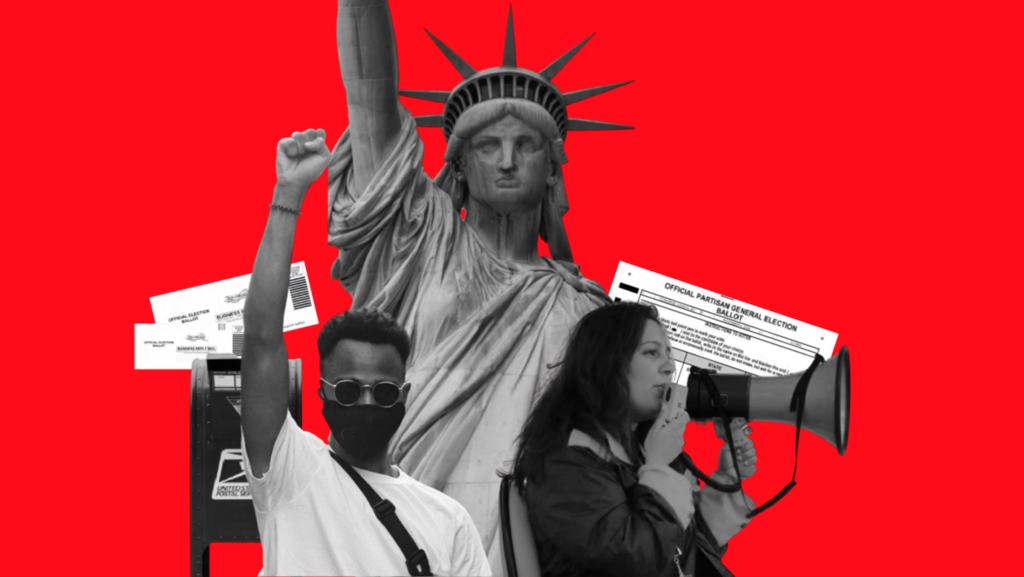What Did You Do When Democracy Was at Stake?

Donald Trump does not want you to vote or have your vote counted.
He knows that he cannot win if every eligible voter is given an opportunity to vote and have their vote counted.
That is why the president regularly spreads lies about vote by mail. It is why his deputy campaign manager admitted “The president views vote by mail as a threat to his election.” And it is why the Republican Party is spending $20 million to fight against voting rights in 41 separate court cases around the country.
Here is just some of what that $20 million is going toward:
- Blocking state efforts to expand access to vote by mail
- Stopping counties from sending out absentee ballot applications
- Banning states from using ballot drop boxes
- Stopping counties from opening more polling places
- Opposing providing voters a chance to cure alleged signature mismatches
- Discarding ballots cast by Election Day despite nationwide USPS delays
- Deploying an army of Election Day poll challengers to intimidate voters
In a fleeting moment of honesty, Trump acknowledged that these court cases are his best chance to retain the White House: “The biggest risk is that we don’t win lawsuits. We have many lawsuits going all over. And if we don’t win those lawsuits, I think — I think it puts the election at risk.”
I have often said that my job is to make sure Trump loses those lawsuits.
But Trump’s tactics of voter suppression have another goal that cannot simply be defeated in the courtroom. He uses the bully pulpit, social media and the power of the presidency to undermine confidence in our voting processes and democratic systems.
Recently, Trump made a spectacle of encouraging people in North Carolina to illegally vote twice in November — once by mail and once in person. He did this not because he really thinks people should vote twice, but because he wanted to again sow doubts about the legitimacy and accuracy of voting by mail.
He mocked our democratic election processes and put his supporters at legal risk of criminal prosecution simply to undermine the legitimacy of an election he seems very likely to lose. He also diverted attention from the real challenges voters are facing — including long lines at the polls and complex rules for mail-in voting.
To combat this threat to our democracy, it is not enough for us to file lawsuits. It is not enough for the media to report the news. And it is not enough for citizens to shake their heads at the damage he is doing.
We must display civic courage and speak out.
Justice Antonin Scalia wrote that “requiring people to stand up in public for their political acts fosters civic courage, without which democracy is doomed.”
We must all commit to civic courage where it is the least comfortable — in the town square, in front of our neighbors and families, in our workplaces and in our daily lives. We must each, as individuals, stand up and speak out about the importance of our democratic institutions and fundamental rights.
Too often we think that it is the job of great men and women to rise to the occasion and lead nations out of dark times. Books like Profiles in Courage lead us to believe that heroic actions come from larger than life historical figures. Stories of the civil rights movement tend to focus on the great leaders and not the courageous acts of the many individuals who marched, boycotted and protested in their everyday lives.
Great leaders only succeed because of the boundless courage of people whose stories are often untold but who had the courage to speak out.
We will not protect the right to vote and preserve our democracy unless every one of us — from all walks of life — is willing to say out loud that the assault on democracy coming from Donald Trump and his allies is dangerous and unacceptable.
The challenge to each of us is to take that step today. Sign our names, send an email, post on social media, put up a sign, tell our customers, clients and coworkers that what Trump is doing and saying about voting and our election process is immoral, a lie and antidemocratic.
We cannot outsource the protection of our democracy to others. We are all responsible to show civic courage in public.
Kamala Harris concluded her nomination speech with words that history will surely remember: “Let’s fight with conviction. Let’s fight with hope…Years from now, this moment will have passed. And our children and our grandchildren will look in our eyes and ask us: Where were you when the stakes were so high? They will ask us, what was it like? And we will tell them. We will tell them, not just how we felt. We will tell them what we did.”
What did you do when democracy was at stake?